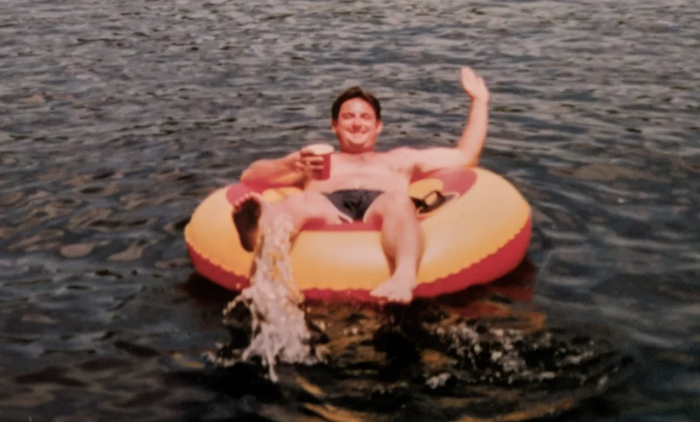At the other end of our street lives a delightful elderly lady caring for her husband in failing health.
My family is glad to shovel her snow, drag her garbage and recycling to the curb, and be on call should she need us in any other way. I was raised to take care of my neighbors, and I am thankful for the opportunity to pass the lesson on to my four kids.
But the real lesson is what I learned from our neighbor. She constantly tried to repay our help with kindness of her own, like peaches from her tree or baked goods she lovingly made from scratch. I declined her gifts for a long time, explaining that my kids needed to learn to give without expectation of receiving anything in return. I was passionate about the value of the lesson, but more importantly, I felt she had her hands full with her dying husband and I didn’t want to add to her burden.
Her disappointment from my refusal to accept some lettuce from her garden was the tipping point. The cumulative declinations were more than she could stand. She explained that, while she appreciated our gestures and had come to rely on my family for support, the arrangement was making her feel awful, and she could no longer accept our neighborly assistance. She told me that a relationship, even one where one party needs help from another, has to be a two-way street. By declining all of her attempts to be kind in return, I was destroying the relationship and making her feel old and worthless.
I thought of her gifts as a burden on her. In truth, giving gifts brought her a joy that would most definitely exceed the pleasure they brought us as the recipients. I’ll never forget what my neighbor taught me about the need for connection to be mutual in order for it to be mutually beneficial.
Relationships, support, help, caring—all of the ways we show love and try to heal—they have to be in balance. There has to be a yin to the yang.
Nowhere is this more true than in recovery from alcoholism.
The Disease of Shame
There is so much shame involved in alcoholism. As an active drinker, I was ashamed that I couldn’t have one or two beers and call it good. Drinking felt so euphoric that I often couldn’t stop once I started. The next day was inevitably filled with remorse, self-loathing, and alcohol-induced depression—all the components of shame. When I tried to quit drinking, the shame of being the only cretin at the party who was too weak and depraved to control my drinking in an alcohol-soaked world was overwhelming. To be such a defective human was often more than I could stand, and I gave in and drank.
I didn’t relapse over and over because of physical cravings or lack of willpower. I relapsed because I was ashamed not to.
Shame kept me in the shackles of alcoholism for 10 years. I drank heavily for 25 years, but didn’t recognize that I’d crossed the line into addiction until I was 15 years into my drinking career. Once I knew I was in serious trouble, the stigma associated with alcoholism, and my embarrassment to have fallen victim to one of the world’s most highly addictive poisons, kept me drinking and suffering for an entire miserable decade.
And my perception of Alcoholics Anonymous—the popular perception my society had taught me—was a driving force in my inability to get treatment for my disease. The vision I had of weak and despicable losers sitting on cold metal folding chairs in damp church basements drinking bad coffee from styrofoam cups and chain-smoking cigarettes as they whined to each other—and no one else—about their out-of-control lives made participation in AA inconceivable for me. I chose what I thought was the only alternative to what I perceived AA to be like. I chose to drink and slide deeper into the pit of debilitating depression.
I’m in my third year of recovery, and I know now how misguided my popular perception of AA was at the end of my active alcoholism. Some of the most vivacious and inspiring recovery warriors I have the pleasure of calling my friends were saved by Alcoholics Anonymous. And while I did not work the 12 steps of the “Big Book” to achieve my permanent sobriety, I firmly believe that alcoholics need something to fill the void left behind when we remove alcohol from our lives, and the spiritual and emotional work required in AA is as effective a void-filler as any other.
I love deeply many of the people who find recovery in the rooms of AA. I thank God for any program that has saved literally millions of lives over many years.
But I have a major problem with a foundational component of AA because I believe it is the enemy of everyone struggling with addiction to booze.
I believe anonymity is killing alcoholics.
Anonymity is the Enemy
I completely understand the purpose of anonymity in AA. I comprehend that the promise of anonymity is a protection offered to people who would otherwise be reluctant to tell their stories for fear of exposure, embarrassment, or job termination. I further know that AA members are free to share their own stories as openly as they care to do so. I get it. I really do.
But I feel passionately that the open sharing of stories of alcoholism and recovery is the single most important factor in curing this disease of shame that afflicts over 15 million Americans and kills over three million people a year. We’ve tried anonymity for a century now, and it has saved a lot of lives. But the epidemic of alcoholism is growing and is responsible for far more carnage than all other addictions.
The widely accepted societal definition of insanity is doing the same thing over and over again and expecting different results. Anonymity for alcoholics fits that definition.
I am open about my high-functioning alcoholism and my shameful struggles in recovery because I know there are millions of people just like me who are on a path to suffering and struggling and hiding their pain all the way to their graves. I shout about my story to anyone who will listen because I know there is a better life waiting for them—even if they are too immersed in the process of drowning in their disease to know it themselves. I recover out loud because the status quo isn’t working, and the only way for me to fully shed the shame and stigma is to be part of the solution that destroys the stigma forever. I want to be on the team that saves millions of lives. Who wouldn’t want that?
Recovering Out Loud
And I want you to be on that team, too.
If you are an alcoholic who is trying to recover, tell someone. Better yet, tell everyone. Your story will resonate. If you love an alcoholic, tell your side of the story loud and proud. Do you think your struggles are unique? What are you embarrassed about? There are over 15 million of us out there. Everyone loves an alcoholic.
If saving millions of lives isn’t the incentive you need to tell your story, tell it for selfish reasons. Tell it because the old lady down the street from me made you do it. You need support, love, treatment, and healing. It is a lot easier to accept the help you need into your life when you have the opportunity to give back. Telling your story for the benefit of the millions of others in your same situation empowers you to develop the relationships that will make your life better.
Connection has to be Mutual in order for it to be Mutually Beneficial
As much as we love to think ourselves unique, alcoholism is simply too pervasive and predictable, and your story is the story of the masses. It’s the same story others hide from the world because anonymity has taught them to be ashamed of it. It’s the same story over and over again. The story needs a new ending, and you can be a part of the rewrite.
No part of recovery from alcoholism is easy, but if we come together, stick together, and remember we are all in this together, we can make it together. Early sobriety is particularly challenging because our desire to drink is strong, and our resolve to abstain is fragile and weak.
I want to help you or your loved one with early sobriety. Please accept my gift to you: my own story and the lessons I have to offer because of it. Please don’t refuse.
Just like a basket of peaches from my neighbor on the other end of my block, your acceptance of my offer means more to me than it means to you.
~
If you are considering making a change to your drinking patterns, or if you are concerned about the drinking of a loved one, I encourage you to read my free e-book, Guide to Early Sobriety.

 Share on bsky
Share on bsky







Read 55 comments and reply